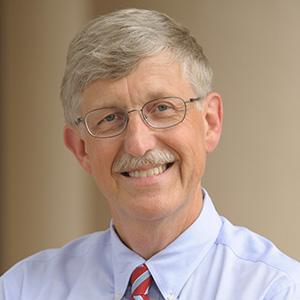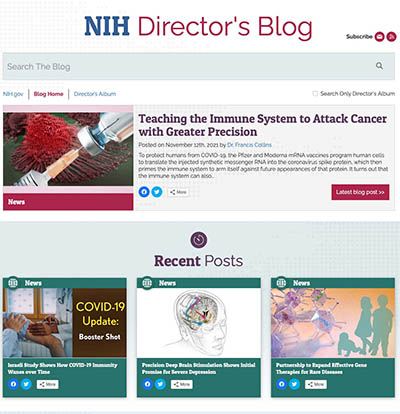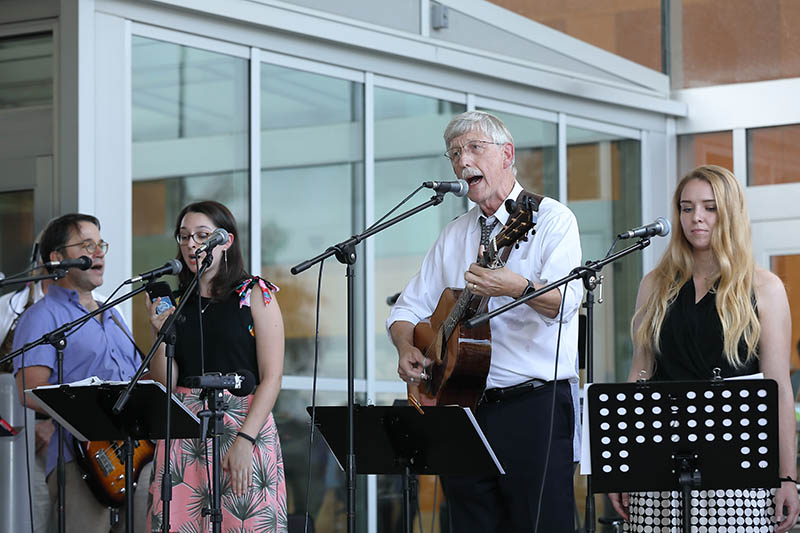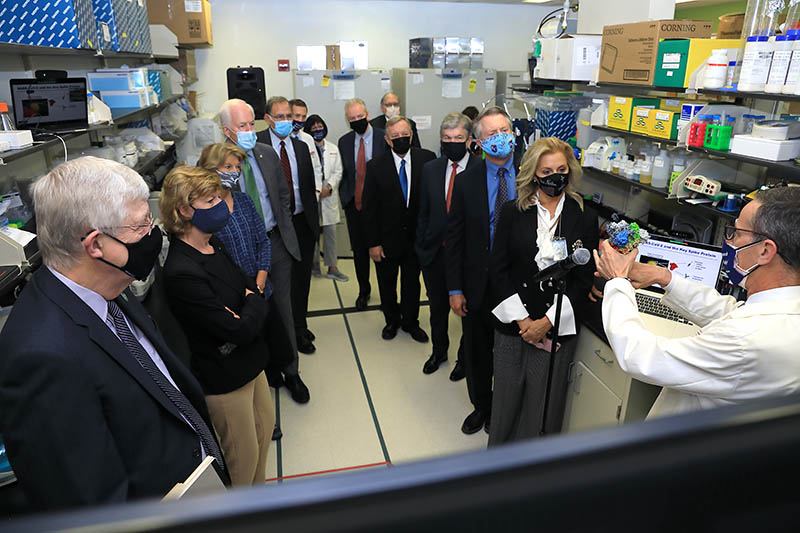A Conversation with NIH Director Francis Collins
World-Renowned Geneticist Discusses His Experience Leading NIH

NIH Director Francis S. Collins will step down after 12 years leading one of the world’s pre-eminent biomedical research institutions.
Francis S. Collins, who is stepping down from his post as NIH Director by the end of the year, spoke recently with staff from The NIH Catalyst, the NIH Record, and the “I am Intramural” Blog. Read on for a few highlights from that conversation, or read the full interview originally published in The NIH Catalyst.
On NIH’s efforts to improve diversity in the scientific workforce
“Diversity is a hugely important issue for our workforce, our grantee community, and our clinical-trials participation. Several years ago I put together a diversity working group of my advisory committee, and out of that came the creation of a new position, the Chief Officer for Scientific Workforce Diversity. The initial holder of that post was Dr. Hannah Valantine, and now Dr. Marie Bernard leads the office. In addition, we have made real strides in increasing diversity in our intramural program through the Distinguished Scholars Program.
“In the extramural arena, we are starting the FIRST [Faculty Institutional Recruitment for Sustainable Transformation] program, which aims to inspire institutions to recruit cohorts of tenure-track faculty with specific interests in diversity. Here at NIH, we founded the UNITE program, which seeks to address structural racism within the NIH-supported scientific community. We are also revamping our health-disparities research effort to be more intentional and more focused on interventions.”
On the biggest achievements within the NIN Intramural Research Program during his time as Director
“There are many examples of intramural achievements I could point to. I could start with the remarkable work being done by John Tisdale’s team on using gene therapy to cure sickle-cell disease and by Steve Rosenberg’s team on cancer immunotherapy efforts that have shown how activating the immune system can provide dramatic responses to cancer, even for people with stage 4 disease. A bricks-and-mortar achievement was getting the funding for the new Surgery, Radiology, and Laboratory Medicine wing of the Clinical Center. Finally, the Vaccine Research Center’s development of the COVID-19 mRNA vaccines will be seen historically as one of the most significant scientific advances of this decade.”
On how to effectively explain scientific research to the general public

Dr. Collins writes about NIH-funded research on his blog.
“Communicating our research is an important part of what all scientists are called upon to do. To be successful, a scientist needs to be aware of whether the information is actually getting across. One of the things that helped me was growing up in the theater. My father was a director and producer, my mother was a playwright, and I ended up on the stage at an early age. It was a small theater where you could see your audience and you knew if you were connecting.
“Before coming to NIH, I taught medical students at the University of Michigan. If you want to be humbled by your own communication deficiencies, this is a great way to discover them [laughs] because med students will turn you off really quickly if you’re not making sense on their level. I always try to imagine the typical background of the person in the group to whom I’m speaking, and how I could put forward a complicated scientific concept in a way that would resonate. I use analogies a lot, because they often help people anchor a scientific finding within a more familiar, everyday experience. I try as best I can to avoid using the jargon terms that science is famous for. Most importantly, I check out the body language of the person or group I’m speaking with to see whether I’m coming across, or whether I need to modify the approach. This is harder to do in the era of everything being virtual.”
On his passion for music and music as a potential therapy for healing
“We live pretty intense, stressful lives, especially under COVID. We all need opportunities to get away from that intensity sometimes and experience something that’s uplifting and re-energizing. For me, music lifts my spirits and is just good therapy. It’s also an enjoyable way to share an experience with others. When the band is really in the groove, and we’re playing a song that’s rocking the house, you can’t help but feel good. Of course, under COVID, the band has not had any gigs because it has not been safe. I’ve really missed that. Right now, my musical experiences have been more of the solo variety, sitting down at the piano or playing my guitar just to change the dynamic after a very intense and busy day. That’s helped me a lot.

Photo credit: Chia-Chi "Charlie" Chang
Francis Collins enjoys playing with his band and performing solo for NIH audiences.
“I do think there’s a lot we can learn about how music touches us in ways that can be uplifting and healing. And that’s what the Sound Health Initiative [an NIH–Kennedy Center for the Performing Arts–National Endowment for the Arts partnership] is all about. I started this with Renée Fleming, the best-known operatic soprano of our era. She’s become extremely knowledgeable and highly effective in this area of connecting science and music. And now NIH, through the Sound Health Initiative, is funding $20 million worth of research that brings music therapists together with neuroscientists to try to understand each other’s approach to how music can be effective in healing. I love the idea of bridging what is often seen as a gap between the humanities and the sciences.”
When asked about his advice for the next Director of NIH
“If I was trying to advise the next NIH Director, I would emphasize the importance of focusing on relationships with members of Congress. If you want NIH to flourish, you need Congress’ support and trust. You want Congress to have confidence in the NIH director, to know that straight answers will be provided when asked for. I’ve probably had close to 1,000 one-on-one visits with members of Congress in the past 12 years. And those usually go really well. Although members of Congress may seem to disagree about everything right now, they all see the value of medical research. Provided with a bit of information about NIH, they see what a remarkably important contribution we make to finding answers to all those conditions that they’re worried about on behalf of themselves, their families, and their constituents.”
On his decision to step down as NIH Director
“I love the NIH. Being NIH Director is probably the best job in biomedical research. Serving as Director during the worst pandemic in more than a century and seeing how the scientific community rose to the challenge with rapid advances in vaccines, therapeutics, and diagnostics has just been breathtaking.

Photo credit: Chia-Chi "Charlie" Chang
Vaccine Research Center Director John Mascola (right) describing vaccine research to a group of United States senators and staff members touring NIH in May 2021; Dr. Collins is on the far left.
“The decision to step down has not been an easy one. But 12 years is a long time to be in this position, longer than any previous presidentially appointed NIH Director. I wrestled with the decision over several months. But ultimately a scientific organization like NIH needs new vision and new leadership from time to time. The NIH Institutes and Centers are in terrific shape — I am proud to have recruited most of their Directors. And I am confident the president will find a terrific leader to serve as the next NIH Director, and that person will bring a whole raft of new and exciting ideas. I’m not going far; I will be hanging out in my NHGRI research lab in Building 50, immersing myself in some really exciting research on diabetes and a rare genetic disease called progeria. I will be cheering for the amazing people and projects that make NIH the National Institutes of Hope.”
Subscribe to our weekly newsletter to stay up-to-date on the latest breakthroughs in the NIH Intramural Research Program.
Related Blog Posts
This page was last updated on Wednesday, July 5, 2023
